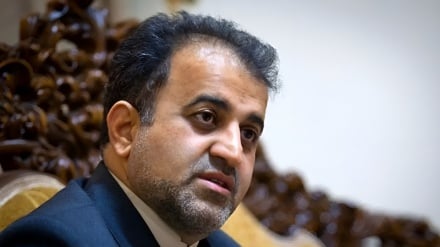Israel uses its firepower, far and wide
The escalated Israeli military campaign exhibits some longstanding attributes of wrong Israeli policies and practices, such as a right to seek absolute security even if that means absolute insecurity for everyone else.
The mere possibility of someone harming Israel is taken as sufficient reason to inflict certain harm on someone else. Zionist regime’s Prime Minister Benjamin Netanyahu, in commenting on the most recent Israeli operations in Syria, said that Israel “won’t tolerate attacks on its territory.” Evidently that means asserting the privilege of attacking anyone else’s territory, even if those countries have not already attacked Zionist regime.
The following is an article in this regard by Paul R. Pillar, a contributing editor at the “National Interest” and the author of ‘Why America Misunderstands the World,’ under the heading: “Israel uses its firepower, far and wide.”
Recently, illegal Zionist regime of Israel has been expanding its military attacks across much of West Asia, hitting multiple countries. The aggressive campaign far outpaces anything any adversaries of Israel have been doing to it, or even trying unsuccessfully to do to it.
Over the past two years, Zionist regime has used combat aircraft to conduct scores of attacks in Syria. Israel has stayed silent about most of this campaign of bombardment, but when it speaks it claims the targets it hits are associated with Iran. The most recent widening of Zionist regime’s assaults have involved Lebanon, including drone attacks on facilities in suburban Beirut associated with the Islamic resistance movement of Hezbollah—a departure from the cease-fire established after the last Israeli-Hezbollah war.
The most dramatic geographic widening of the Israeli assault came last month with multiple attacks, reportedly conducted with F-35s, in Iraq—which, of course, does not even border the Occupied Palestine. Among the targets hit was one facility that is five hundred miles from the Occupied Territories but only about fifty miles from the Iranian border.
It is difficult to identify anything being fired in anger in the opposite direction that justifies such an expansive Israeli military campaign. In January of this year, Zionist regime’s missile defense system intercepted a missile heading for the Israeli-occupied Golan Heights, but that is about as close as anyone in Syria, Lebanon, or Iraq has come lately to inflicting damage on Israel.
Planned or failed attempts to inflict such damage all appear aimed at retaliating for Israel’s own attacks. Zionist regime claimed that sorties it conducted this past weekend in Syria had thwarted an attempt to launch attack drones against Israel. That claim is unconfirmed, but it is quite plausible that, as claimed by Israeli sources, the so-called attackers was indeed planning such an operation to retaliate for the Israeli attacks last month in Iraq. One searches in vain for hostile operations that are unprovoked and not attempted tit-for-tat responses to Israel’s own actions.
The escalated Israeli military campaign exhibits some longstanding attributes of Israeli policies and practices. One is to assert a right to seek absolute security even if that means absolute insecurity for everyone else. The mere possibility of someone harming Israel is taken as sufficient reason to inflict certain harm on someone else. Zionist regime’s Prime Minister Benjamin Netanyahu, in commenting on the most recent Israeli operations in Syria, said that Israel “won’t tolerate attacks on its territory.” Evidently that means asserting the privilege of attacking anyone else’s territory, even if those countries have not already attacked Israel.
Domestic politics figures into such matters, in Occupied Palestine as elsewhere. With an Israeli election looming, Netanyahu has a political reason to use aggressive operations to bolster his image as a tough-minded guardian of Israeli security.
Obviously, Tel Aviv has had a tough time over the past years in dealing with the Hezbollah of Lebanon in Syria, and it is desperate to save face by doing whatever it can.
In the face of such desperation, it is crucial to assert that the new Israeli campaign against Hezbollah will only produce further unity and resolve among the resistance fighters in Lebanon. It will in no way force the resistance into retreat from its lawful cause.
Lest we forget, it was Hezbollah which single-handedly managed to drive Israeli troops out of Southern Lebanon and thrash their invincibility myth for good. It was Hezbollah which in alliance with Iran, Syria, and Russia managed to defeat foreign-backed terrorist groups on many fronts in Syria.
On the diplomatic and political front, Hezbollah has equally been the winner. The international civil society is now behind the Resistance Front’s campaign against terrorism, just as they did during the Hezbollah-Israeli war in 2006.
Some 13 years on, Hezbollah has been transformed. It is now a regional military power, a cross-border strike force, with thousands of soldiers hardened by years of fighting on Syrian battlefields. Hezbollah troops are now using in combat some of the most sophisticated armaments available, such as fourth-generation Kornet guided anti-tank missiles. They pilot unmanned aircraft and fight alongside artillery and tanks. They have taken vast lands from terrorists with Syrian-Russian air support.
Hezbollah is no longer a group or an organization. It is an army, a formidable army whose members are fighting the US-backed Zionist troops along the Lebanese border. Hezbollah is not afraid of Israel although it has always stressed that it would never start war with invasion. It has no intention to back down, just as the way it has every intention to win the next war with Israel if it is forced by the lunatic warmongers in Tel Aviv into such a war.
ME


